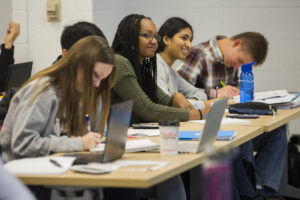My research involves projects related to faculty teaching, student learning, and the relationships between those. Some of my current projects are listed below. Please contact me to learn more!
- Student resistance to active learning
This goal of this multi-institution project is to disseminate previously-identified strategies instructors can use in the classroom to effectively reduce student resistance to active learning. This project involves designing a faculty development workshop to promote use of the strategies and conducing a randomized control trial to study the impact of the workshop on faculty’s self-efficacy for and actual use of the strategies and students’ subsequent behavior in the classroom.
The project is funded by National Science Foundation grant #1821488.
. - Success of STEM college students with ADHD
The goals of this project are to study factors of the college experience that are associated with the academic success of college students with ADHD in the STEM fields and more broadly, to contrast those to factors related to the academic success of students without ADHD, and to identify classroom teaching practices that improve the college experience. The research will involve statistical modeling and student interviews, and it is expected to provide actionable recommendations for classroom teaching practices that support academic success of college students with ADHD.
This project is funded by National Science Foundation grant #2043430.
. - Engineers’ ability to address public welfare issues
Through both a representative survey of US engineers and a longitudinal interview study of electrical and computer engineering master’s students, the study will explore the extent to which engineering professionals and students recognize, strategize about, and act on concerns for public welfare and will identify factors that promote or undermine these outcomes. The research findings will inform the design of a graduate seminar to train engineers to recognize and understand how to respond when they encounter situations where they perceive the health and safety of the public to be at risk. This project will provide a model for engineering programs at other institutions to enhance professional responsibility training among their students, will contribute to the knowledge-base on engineering workforce onboarding and training, and will serve as a benchmark for research on engineers’ understanding of their public welfare responsibilities.
This project is funded by National Science Foundation grant #2053046.

 MENU
MENU 
